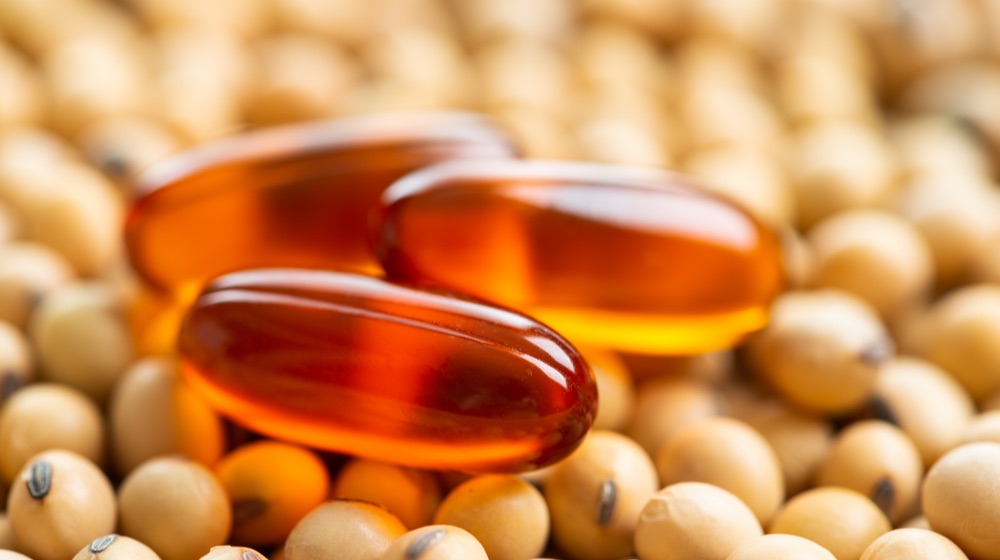Lecithin Benefits and Side Effects: 10 Surprising Truths
What are the benefits of Lecithin? What are the side effects of Lecithin? Learn what Lecithin benefits and side effects are here.
Related: Psyllium Husk Benefits | Top 11 Healthy Benefits of Psyllium Husk
Lecithin Benefits and Side Effects: The Surprising Truths
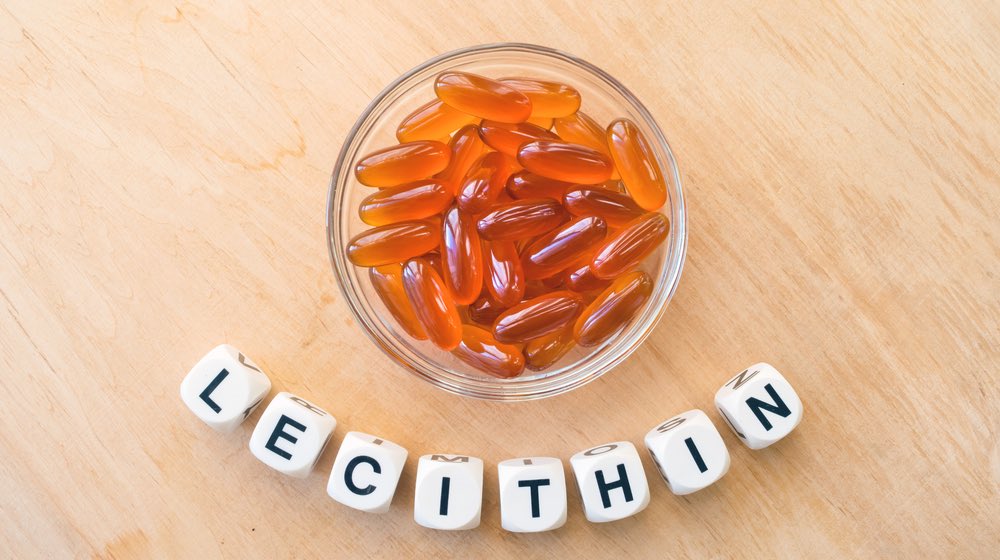
Lecithin is a lipid you can find in all cells of the body. It is necessary for the proper functioning of the brain, liver, and muscles.
Lecithin has many benefits.
Lecithin's benefits include improving cholesterol levels, preventing gallstones, and helping with weight loss.
But, Lecithin also has some side effects that you should know before taking it.
We will help you decide if Lecithin is right for you! Read on to learn about the benefits and side effects of Lecithin in detail.
What is Lecithin?
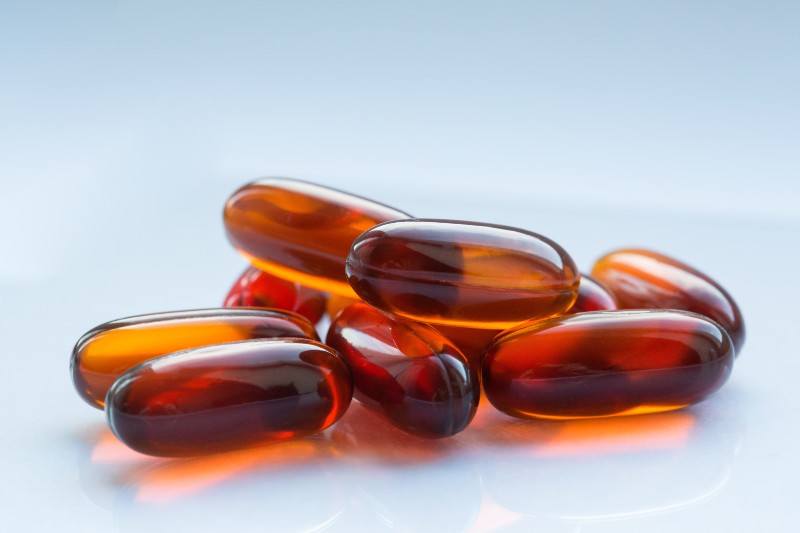
Lecithin is a part of all your cell membranes and bile. So it's a type of phospholipid in all cells of the body. Lecithin benefits many physiological processes, including metabolism, nerve function, and cell structure.
Sources of Lecithin
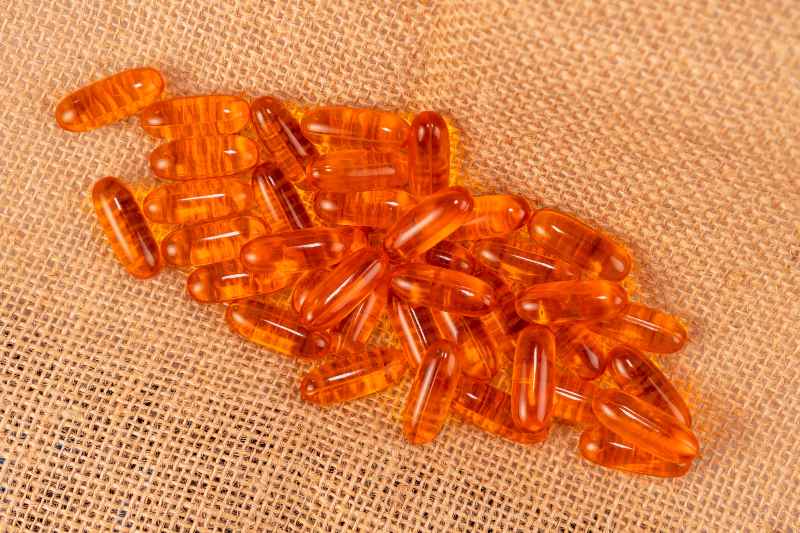
Lecithin is a combination of phospholipids and oil.
Lecithin is a fat-like substance found in all your cells. You can also find it in plant cells.
Lecithin can be from sunflower kernel, rapeseed (canola), milk, soy, and egg yolks.
Food Sources of Lecithin
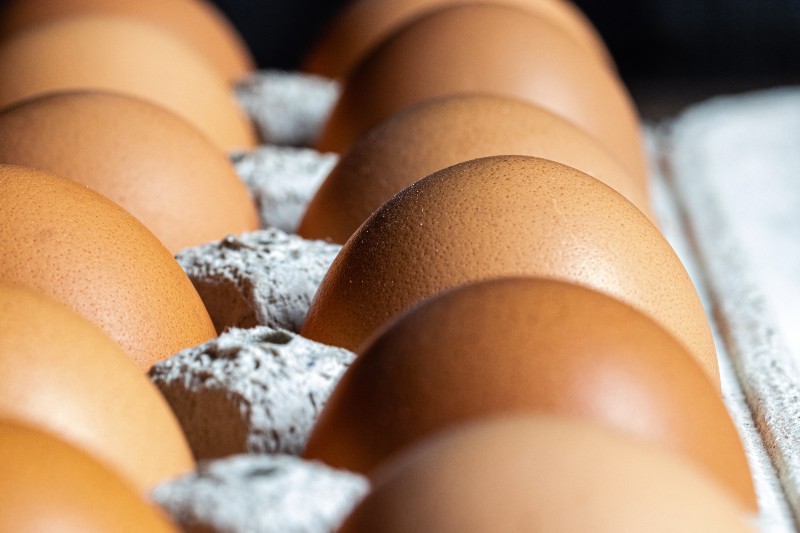
Egg yolk is one of the top things where you can find Lecithin. Fun Fact: The Greek word for Lecithin means yolk.
- One egg would have 3362 milligrams of Lecithin.
- 3.5 ounces of Beef has 466 milligrams of Lecithin
- One-half cup of Cauliflower has 107 milligrams of Lecithin
- One ounce of Peanuts has 105 milligrams of Lecithin
- Organ meats like liver are complete with Lecithin
Types of Lecithin

Lecithin occurs naturally in many foods.
Lecithin supplements are from eggs, soy, or sunflower seeds in general. Lecithin can also be from canola, cottonseed, or animal fats.
Soybeans are one of the most cost-effective sources of Lecithin. Soybeans are one of the most cultivated crops in the United States. 94% of it is genetically modified. Chemicals extract Lecithin from soybean oil. These chemicals include acetone and hexane.
Sunflower Lecithin is becoming popular with the need to disclose allergens in meals. Sunflower Lecithin is a good alternative for individuals who avoid genetically modified crops. The extraction process is less severe. And it's cold-pressed rather than using chemical solvents.
Soy Lecithin
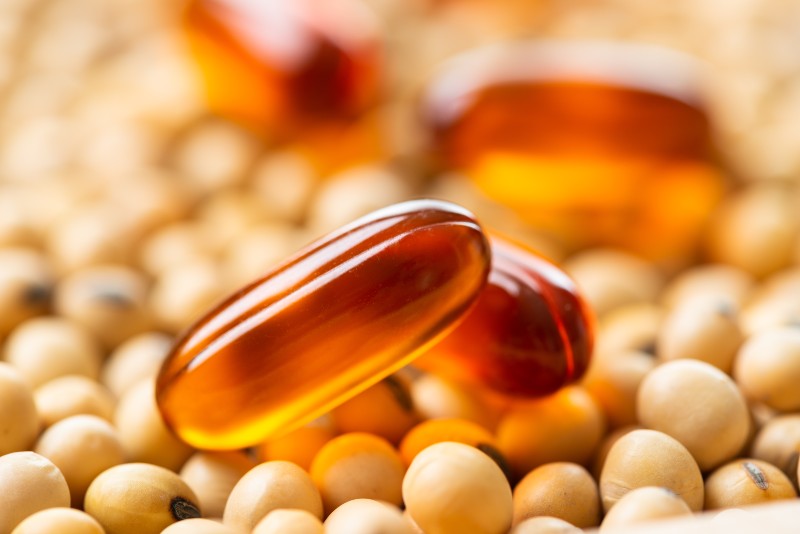
Soy lecithin is one of the most omnipresent additives in today's food supply. You can find it in everything from chocolate, margarine, and salad dressings to tea bags.
If you've ever seen soy lecithin in the ingredient list of your food, you might be wondering what it is.
What is Soy Lecithin
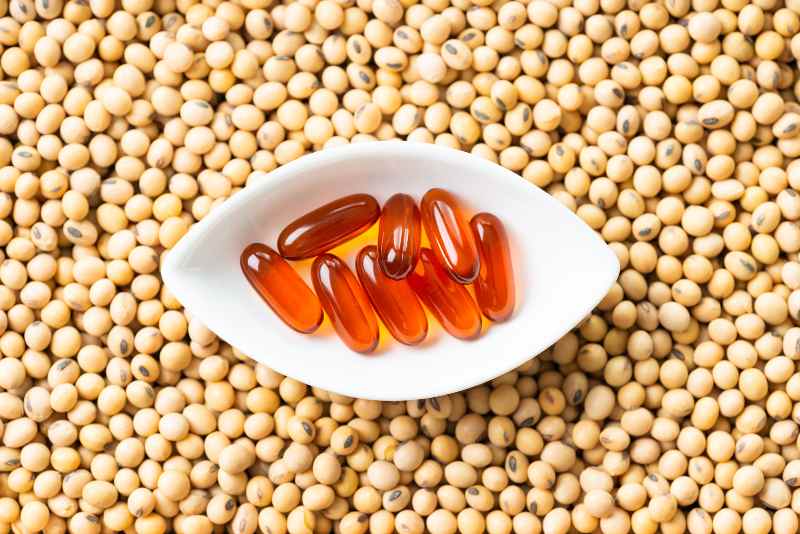
Soy lecithin is a food additive that comes from soybeans. It's generally used as an emulsifier or lubricant when added to food. It also functions as an antioxidant and flavor protector.
Is Soy Lecithin Bad for You?

Like many food additives, soy lecithin isn't without controversy. Many people believe it carries potential health risks. While others say, it's safe. So, what do you need to know about soy lecithin?
What Is Soy Lecithin Made Of
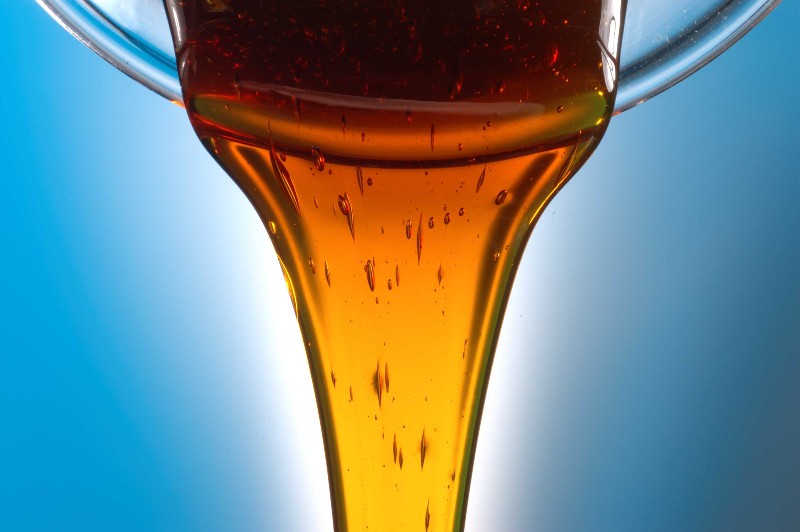
Soy lecithin from soybean oil. Soy lecithin is of:
- Soybean oil
- Phosphatidylcholine
- Phospholipids, and
- Glycolipids mixed with phospholipids and oils.
How is Soy Lecithin Made
Lecithin is naturally present in soybeans. But it is often made using harsh chemical solvents.
The process begins with dehulled and crushed soybeans. The soybean oil is then extracted from the beans using either a solvent or an expeller press. After oil extraction, Lecithin becomes separate from the oil and purified.
The soybean oil goes through “degumming” to remove impurities.
The oil is then treated with alcohol to remove soybean proteins.
The soy lecithin is then separated from the soybean oil and dried.
Why Soy Lecithin Is Bad
You see Lecithin in specific ingredients that usually come from soy. For example, chocolate, baked goods, and other products from soy. The problem is the majority of soy is GMO. They extract Lecithin from soy using a solvent, hexane.
By avoiding most processed foods, paleo dieters cut their exposure to them.
Getting your Lecithin from soy products is not recommendable. But it is not that bad to ingest tiny amounts of soy lecithin as an ingredient.
When buying something with soy lecithin as an ingredient, make sure it is organic to avoid GMOs.
The best source of Lecithin would be to consume eggs, Beef, or organ meats—more than a supplement.
Lecithin Health Benefits
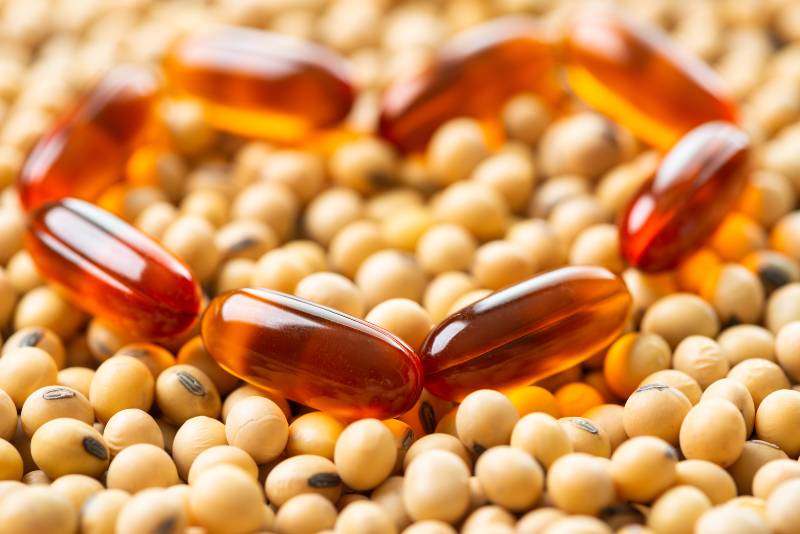
Lecithin is a phospholipid found in both animal and plant sources. Lecithin benefits include improved cognitive function, cardiovascular health, and enhanced sexual function. So if you are looking for a way to improve your health and well-being, adding Lecithin to your diet may be the answer!
Lecithin Benefits Brain

Lecithin is an emulsifier that contains choline. Choline is a chemical used by the brain for communication. A diet high in choline showed improved memory and aid for those with Alzheimer's disease.
Lecithin supplementation can help treat bipolar disorder. It can also help aid:
- ADHD
- Memory issues
- Dementia
- Ticks or tremors
- Other neurological issues
Lecithin Benefits Hair

If you're looking for a way to improve your hair's appearance, Lecithin might be your answer.
Many hair care treatments include Lecithin. For instance, Lecithin is an ingredient in many conditioners, hair treatments, and shampoos. Also, you can find it in hair dyes and perms.
Lecithin is an oily substance. It is an essential ingredient, especially for people who have dry, brittle hair. It helps turn dry, brittle hair into silky, shiny hair.
Lecithin helps create a barrier between the hair shaft and the chemicals. As a result, it helps to protect the scalp from damage caused by chemical treatments. It's also beneficial for people who have damaged hair due to chemical treatments.
Lecithin also reverses some of the effects of hair aging.
Lecithin Benefits for Liver | Lecithin for Liver

Lecithin is powerful in reversing Fatty Liver. Lecithin contains choline, which is very powerful in changing a fatty liver. Lecithin triggers the release of bile from your gallbladder. When you have more, you will have more breakdowns or digestion of fat in your liver.
Phosphatidylcholine supplements are available as soy lecithin or sunflower seed lecithin. Lecithin can help:
- Detox the liver and gallbladder
- Support detoxification in the liver, and
- Promote bile flow
Research shows that daily Lecithin consumption can help to lower liver enzyme levels.
Lecithin Cholesterol Benefits
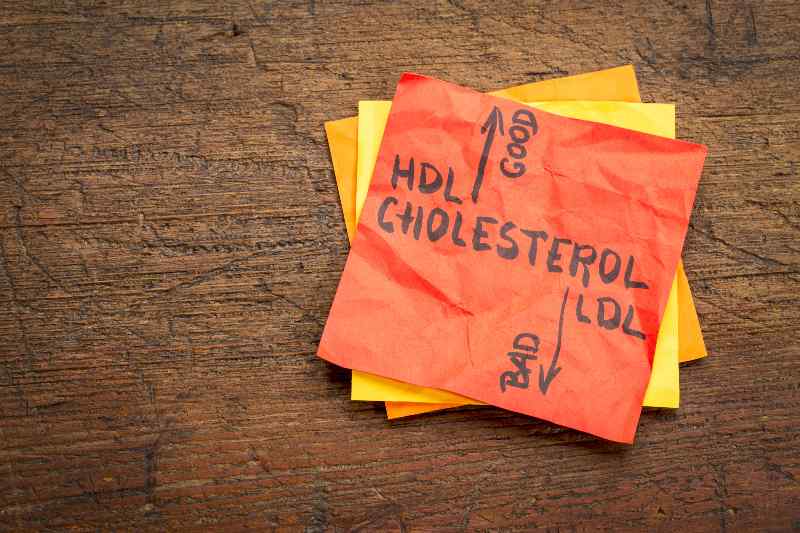
The most well-known benefit of lecithin is its ability to reduce cholesterol. A study found soybean lecithin to raise good HDL cholesterol. It also found lecithin to lower bad LDL cholesterol in blood profiles.
Lecithin supplements have shown promise in lowering cholesterol. For example, in a 2008 study, participants took 500 milligrams (mg) of soy lecithin daily. After two months, it showed the average total cholesterol of participants to be 42% lower. It also showed a 56.15% lower LDL cholesterol.
Lecithin Skin Benefits

Lecithin benefits skin. Lecithin is an emollient and moisturizer that soothes and rejuvenates the skin.
Lecithin is present in a variety of skincare products. Most of these products use hydrogenated Lecithin. It's a humectant that helps to smooth out skin and restore moisture.
Some people use Lecithin to treat acne and eczema.
Lecithin Function in Lungs

Lecithin benefits your ability to exchange oxygen. Breathing requires Lecithin.
There are certain genetic conditions that you're born without enough Lecithin. Due to that are some major lung problems.
Lecithin is an anti-inflammatory.
Because Lecithin triggers bile, it helps reduce the risk factor of gall stones. So make sure that you include foods high in Lecithin, which would be at the top of the list.
Benefits of Lecithin Sexually

Lecithin can also improve your sex life! Here are some of the ways Lecithin can help:
- Increase libido
- Improve sexual function
- Intensify Orgasms
Lecithin Prostate Benefits

Lecithin can increase sperm count and improve fertility. Lecithin increases the plasma membrane fluidity of sperm. It signals transduction pathways, improving fertility potential.
Lecithin Benefits Breastfeeding

Lecithin helps prevent the milk ducts from getting plugged.
Lecithin increases the polyunsaturated fatty acids in milk. As a result, it decreases its stickiness. It makes breast milk less thick and less sticky. So it prevents clogging. As a result, it also improves the quantity of milk you produce.
Health Benefits of Lecithin
If you're looking to improve your health, get your lecithin benefits by including it in your diet!
Lecithin is essential for a healthy lifestyle.
So, what are the health benefits of Lecithin?
- Lecithin is a powerful source of choline, which is essential for brain health.
- It helps keep cholesterol levels in check and can improve liver function.
- Lecithin supports cardiovascular health and can help reduce inflammation.
- Lecithin is an excellent source of essential fatty acids. Essential Fatty Acids aid our bodies to function.
From improving brain function to protecting the liver, Lecithin is a true superfood!
Lecithin Side Effects
Lecithin supplements are safe in general. But they were not subject to the same levels of regulation as prescription medicines.
Ask a doctor before taking Lecithin or any other supplement. Do this, especially if you take medications or have a health condition or allergies.
Here are some potential side effects of Lecithin:
- Indigestion
- Nausea
- Vomiting
- Diarrhea
Lecithin can also cause an allergic reaction in some people.
Stop taking lecithin and talk to your doctor if you experience these side effects.
Lecithin has a role in the development of atherosclerosis. Atherosclerosis is the hardening of the arteries. As a result, Lecithin may increase the risk of heart attacks and heart disease.
Best Lecithin Supplement
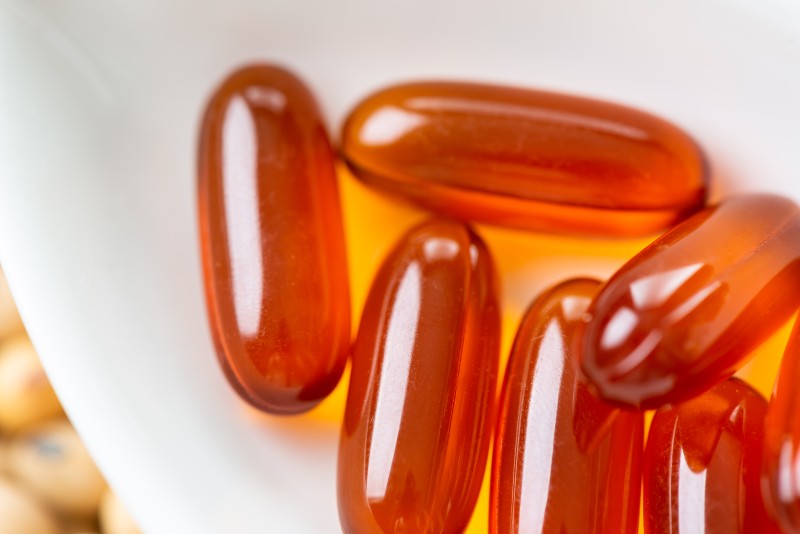
The Food and Drug Administration (FDA) does not regulate supplements in the US.
Unfortunately, this implies that there is no guarantee of their purity and safety.
Look for supplements that have undergone third-party verification. Here are some 3rd party organizations:
- U.S. Pharmacopeia (USP)
- NSF International
- ConsumerLab
These organizations test the ingredients in supplements. They make sure that the supplements are pure. And they also sample the supplements to see if they contain what is on the label.
Lecithin Powder Vs. Liquid: What's the Difference?
Lecithin is an emulsifier found in both powder and liquid form.
Lecithin powder comprises tiny granules that disperse in water or other liquids.
But, Lecithin liquid is a thick syrup that is harder to dissolve. It is a thick, viscous substance of small globules of Lecithin suspended in oil.
So, what's the difference between lecithin powder and liquid?
Watch this video of Kitchen Alchemy from Modernist Pantry to find out:
Have you tried incorporating Lecithin into your diet? What benefits have you noticed? Please share with us in the comments section below.
You Might Also Like:
Trending
Tongue Color | 7 Scary Tongue Color Meanings
Lecithin Benefits and Side Effects: 10 Surprising Truths
Get Updates
SIGN UP FOR OUR NEWSLETTER TODAY

Best Multivitamin for Men | Top 10 Best Multivitamins for Men 2022

Tongue Color | 7 Scary Tongue Color Meanings
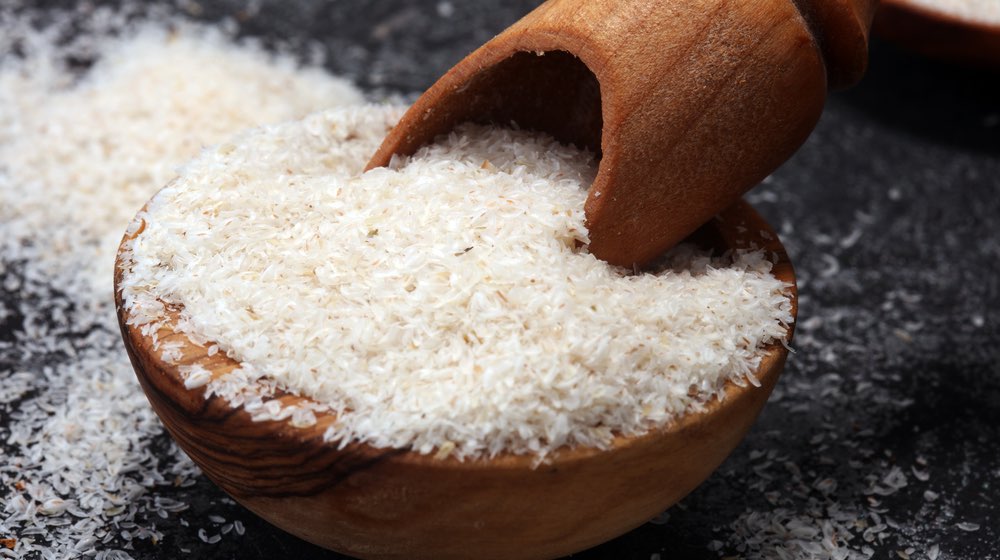
Related

Best Multivitamin for Men | Top 10 Best Multivitamins for Men 2022

